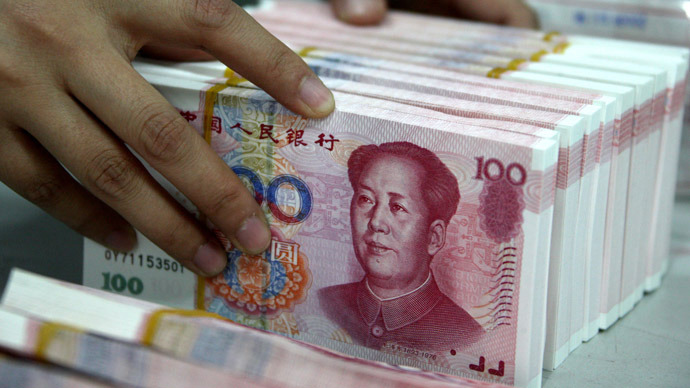However, Washington refrained from filing charges against China. Now, it is not excluded that the Asian country decided that since it was accused of manipulating the currency so much, why not actually resort to this. It is not widely publicized, but on the other hand, currency manipulations are a well-known weapon in the trade war, which is actually led by the two largest economy of the planet.
On Wednesday, the yuan renewed its annual minimum against the US dollar. It happened immediately after another threat from Washington, and it is really very dangerous this time. The White House threatened to impose tariffs on almost all Chinese goods imported into America. It is obvious that the PRC cannot equally answer to this move.
The record fall of the yuan, however, raised doubts about Beijing's ability to repel threats from America through currency manipulation. On Friday, 1 dollar was equal to 6.62 yuan. Over the past three months, the Chinese currency has fallen in price against the dollar by 6%. The fall began in March, when President Trump announced plans to punish China for unfair competition in trade. It is known that a weak currency spurs exports.
The devaluation of the yuan took place a few days after the Chinese central bank People's Bank of China reduced the minimum amount of reserve funds for banks. It is expected that this measure will increase the amount of liquidity in the Chinese financial system by $ 108 billion.
This year, the central bank of the PRC for the third time reduces the mandatory reserve ratio for banks. Experts expect its further decrease as the tension in trade between China and the United States is growing.
In April, the Trump administration, despite repeated promises, refused to openly accuse China of manipulating the currency. The Ministry of Finance issued its first semi-annual report 2018 on the monetary policy of America's major trading partners. The paper pays special attention to the search for traces of currency manipulation. The latest report says that China has a current account surplus in trade with the US. However, the authors of the report stressed that Beijing did not interfere with the situation in the foreign exchange market at least openly.
Nevertheless, the Ministry of Finance of the United States keeps the PRC in the "monitoring list". Countries that fall into this black list risk being under sanctions if the following conditions are met:
1. Have a large surplus in trade with the US
2. Have a "material" surplus of the current account in trade with the US
3. Repeatedly unilaterally intervene in the activities of foreign exchange markets.
Devaluation of currency is an effective, but double-edged and therefore dangerous for both sides of the conflict. It threatens to provoke the flight of capital from China, just like happened in August 2015. In addition, the devaluation will undoubtedly further aggravate relations with President Trump, whom Beijing obviously does not need to anger in this situation. This means that Beijing should use the secret-explicit currency weapons very carefully.
source: reuters.com
On Wednesday, the yuan renewed its annual minimum against the US dollar. It happened immediately after another threat from Washington, and it is really very dangerous this time. The White House threatened to impose tariffs on almost all Chinese goods imported into America. It is obvious that the PRC cannot equally answer to this move.
The record fall of the yuan, however, raised doubts about Beijing's ability to repel threats from America through currency manipulation. On Friday, 1 dollar was equal to 6.62 yuan. Over the past three months, the Chinese currency has fallen in price against the dollar by 6%. The fall began in March, when President Trump announced plans to punish China for unfair competition in trade. It is known that a weak currency spurs exports.
The devaluation of the yuan took place a few days after the Chinese central bank People's Bank of China reduced the minimum amount of reserve funds for banks. It is expected that this measure will increase the amount of liquidity in the Chinese financial system by $ 108 billion.
This year, the central bank of the PRC for the third time reduces the mandatory reserve ratio for banks. Experts expect its further decrease as the tension in trade between China and the United States is growing.
In April, the Trump administration, despite repeated promises, refused to openly accuse China of manipulating the currency. The Ministry of Finance issued its first semi-annual report 2018 on the monetary policy of America's major trading partners. The paper pays special attention to the search for traces of currency manipulation. The latest report says that China has a current account surplus in trade with the US. However, the authors of the report stressed that Beijing did not interfere with the situation in the foreign exchange market at least openly.
Nevertheless, the Ministry of Finance of the United States keeps the PRC in the "monitoring list". Countries that fall into this black list risk being under sanctions if the following conditions are met:
1. Have a large surplus in trade with the US
2. Have a "material" surplus of the current account in trade with the US
3. Repeatedly unilaterally intervene in the activities of foreign exchange markets.
Devaluation of currency is an effective, but double-edged and therefore dangerous for both sides of the conflict. It threatens to provoke the flight of capital from China, just like happened in August 2015. In addition, the devaluation will undoubtedly further aggravate relations with President Trump, whom Beijing obviously does not need to anger in this situation. This means that Beijing should use the secret-explicit currency weapons very carefully.
source: reuters.com





